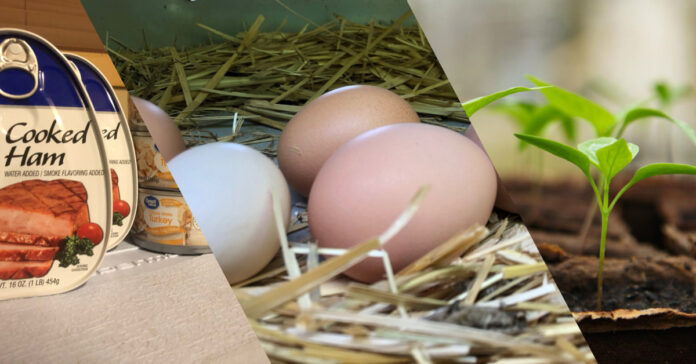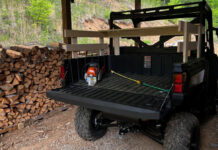Before reading this, you should read Part One.
We got Lucky
Two years ago, I moved out of the suburbs, into a house half the size of our old one, onto land where I could raise some of my own food, one property where I can hunt, into a house that is heated by a woodstove, with a gravity-fed water system, at the end of a long, steep private dirt road. We reduced our expenditures and prepared to hunker down during the pandemic.
I made this move because I was a prepper and wanted to be prepared for an end-of-the-world scenario featuring a quick disaster that disrupted utilities, destroyed governments, and left some of us alive in our own in pockets of civilization. My wife supported the move because she knew my goal was to live on the side of a mountain and raise goats (I got the first half of that wish) and she wanted to live somewhere with cooler summers and a lower cost of living.
After moving in, we started raising chickens because we eat eggs every day, and I felt chickens were an ideal livestock for preppers. I became a beekeeper because it was a hobby I had previously enjoyed, plus it had some prepping benefits. I planted a garden because I believe every prepper should have one. We started making infrastructure improvements like fencing and stockpiling firewood. I didn’t expect that these activities would help us survive inflation, but they will.
Never did either of use suspected that our mountain side prepper property would be a darn good location from which to watch the country sink like the Titanic. The iceberg is dead ahead, some passengers are preparing the lifeboats, but our government is still rearranging the deck chairs while the band plays on.
Check Your Preps
At the time of our move, I didn’t realize increasing our level of self-sufficiency would help us survive as life as we know it decays, when the shelves empty, and we slip into a depression. It turns out that prepping for the end of civilization after a disaster has wiped away the modern world has left us well prepared for the slow slide end-of the world scenario that we are living through. I prepared to live a life like they had in the 1880s without electricity or gasoline, only to be prepared for the hybrid lifestyle discussed in yesterday’s post.
Look at your preps. Imagine yourself in a situation like Venezuela suffered when their economy collapsed. I bet you are better prepared for the third worldization of the United States that you think. If not, this is the time to step up your prepping. If so, get even better prepared.
Get Prepared for the Hybrid Life
I’m not suggesting you duplicate our process, but pick the parts of our new lifestyle you can implement and do it. For example, you might be able to raise chickens or put in a garden. Consider what other steps could help you survive in this new, hybrid life where we have high speed Internet and every modern convenience (when the power is on) but can’t afford to heat our house or feed our kids. Below are some suggestions.
Cut your Expenses
As inflation rises, all but the very rich will have to cut back on their spending. My advice is to cut back now and use those savings to become better prepared. Don’t want until you have to spend less; start spending less now and redirect those funds to be better prepared for when things get even worse because as of right now, there is no end in sight.
Don’t pay for luxuries and conveniences when the cost of necessities are going up. Use that saved money to buy and store extra necessities.
Don’t pay others to do what you can do, whether it’s bathing the dog, painting a wall, or mowing your lawn. Not only will this save you money, it will help you develop useful skills.
Cut back on vacations, unless it’s to your retreat. Avoid large expenses, like buy cars, boats and “toys.” When the economy crashes, you can buy gently used models cheap if you still have money.
For your higher bills, look for ways to cut back. Can you use less electricity? Do you need that second refrigerator? Can you dry your clothes on a clothesline? Can you cancel that subscription? Is there something you can sell to raise funds?
If you can’t cut your expenses, then look for ways to make more money. Work overtime, if it is available. Get a second job, or a work side gig. Use your money to prepare while it is still possible.
Build your Food Supplies
There seems near universal agreement that we will experience a food crisis that combines sky-high prices with shortages. That should be a flashing red warning sign to buy and stockpile food. Also consider growing and raising your own food, because every little bit helps. Find local sources of food, like farmers and homesteaders who sell at local farmer’s markets, and build relationships with them. Look for other opportunities to barter and to build relationships with like-minded people. You may come to rely on them when you can’t find what you need at the store. They might be a source of seeds when it’s time to plant next year’s gardens.
As a prepper, you should already have a food storage program. Take an inventory, review it, update it, and look for holes you need to plug or places where you can add depth. Do you have a good multivitamin on hand? Do you have any antibiotics in your stash?
Start cooking from scratch and eating less prepared foods. Not only will cut your food costs and provide healthier food, you will need to practice for a time when prepared foods are not available. Yes, flour has gone from $8 to $12 for a twenty-five-pound bag, but it’s still far cheaper to bake bread than to buy it.
Reconsider your Needs vs your Wants
Here’s an exercise to help you save: Carry a notebook and write down everything you do and every penny you spend for two weeks or a month. (Or store the list it in your phone if a notepad is too old fashioned for you.) Each day, sit down and take a serious look at the list. Ask yourself, did I do that for fun, because I felt obligated to do so, or because I had to? Did I buy that because we needed it or because we wanted it? What would have happened if I hadn’t done that/purchased that? Could we have lived without it?
I find I do many things because I feel obligated. Some obligations you don’t want to skimp on, like visiting an elderly relative or help someone who helped you in the past. But there may be some “obligations” you can gracefully bow out of, like the baby shower for your cousin’s daughter or the birthday party for someone in your kid’s nursery school. That second job even may come in handy: “We’d love to come, but I’m working overtime that weekend.”
Spend your Time Wisely
Many Americans waste hours of time in front of screens, either social media or TV. If you are one of them, think how much money you could make, how many home improvements you could accomplish, or how many rows of garden you could plant or weed if got your ass up off the couch and got to work. Consider it a sign if you have run out of shows to binge watch on your favorite streaming service. Instead of zoning out in front of the TV, get a job as the night clerk at a hotel, find work as a bartender, or work the late or early shift at a hospital or an IHOP. Even unskilled labor can make around $15 an hour these days.
For more than two decades, I went to work every morning, came home for the family dinner, made sure the kids did their homework, read them stories, tucked them in at night, and then fired up my home computer to work three or four more hours before joining my wife in bed. What’s stopping you from doing the same thing? Be more productive and you will accomplish more in life, make more money, and likely be happier and feel more accomplished. I find work is its own reward. If you don’t, it may be time to look inward and re-evaluate your personal goals. Do you want to survive the coming collapse?
Your Survival Depends on You
Surviving the hybrid life we are facing will present problems for most, but opportunities for a select few. Chance will not select those few; their actions will. They will be capable people who are prepared, people who can take a risk, work hard, and persevere. They won’t be the ones watching cat videos or braless girls dancing on TikTok. I’m not saying don’t indulge yourself, but do it occasionally, as a reward, not as a way of life.
The survival of you and your family depends largely on you, your spouse or partner, and your actions. It does not depend on the government, nor your employer. Step up, take responsibility and you may be able to thrive during the coming bad years. Have a goal. Plan, prepare, and be willing and able to work hard to achieve it. Because the alternative will be ugly.
Societal collapses kill millions. Take action now to avoid being a statistic.







